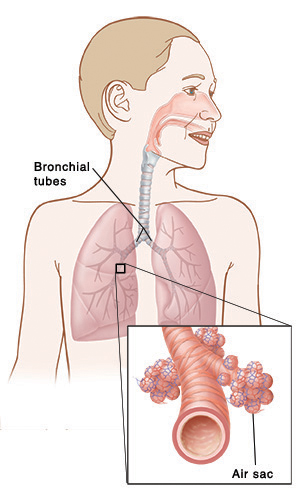Pneumonia (Child)
Pneumonia is an infection inside the lungs. It may be caused by a virus or bacteria.
Symptoms of pneumonia in a child may include:
Pneumonia is caused by bacteria or a virus. When caused by bacteria, it's often treated with an antibiotic medicine. Your child should start to get better within 2 days on this medicine. The pneumonia will usually go away in 2 weeks. Pneumonia caused by a virus is not treated with antibiotics. It may last up to 4 weeks.

Home care
Follow these guidelines when caring for your child at home.
Fluids
Fever makes your child lose too much water from their body. You need to replace that lost water. For babies younger than 1 year:
-
Continue regular breast or formula feedings.
-
Between feedings, give oral rehydration solution as instructed by your child’s healthcare provider. This is a drink you can buy at grocery stores and drugstores. You don't need a prescription.
For children older than 1 year:
-
Give your child plenty of fluids. This includes water, juice, and sodas without caffeine. You can give them ginger ale, lemonade, fruit drinks, and ice pops.
Feeding
It’s OK if your child doesn’t want to eat solid foods for a few days. Make sure that they drink lots of fluid.
Activity
Keep a child with a fever at home resting or playing quietly. Encourage frequent naps. Your child may go back to daycare or school when the fever is gone and they are eating well and feeling better.
Sleep
Your child may have periods of sleeplessness and irritability. This is common. A congested child will sleep best with their head and upper body raised up. You can raise the head of the bed frame on a 6-inch block.
Cough
Coughing is a normal part of this illness. A cool mist humidifier at the bedside may be helpful. Over-the-counter cough and cold medicines have not been proven to be helpful. These medicines can cause serious side effects, especially in children under age 2. Don’t give cough and cold medicines to children younger than age 6 unless the healthcare provider tells you to.
Don’t smoke around your child. Don't let others smoke near your child. Cigarette smoke can make the cough worse.
Don't give honey to children younger than 1 year.
Nasal congestion
Suction the nose of infants with a rubber bulb syringe. You may put 2 to 3 drops of salt water (saline) nose drops in each nostril before suctioning. This will help remove secretions. Saline nose drops are available at drugstores. You don't need a prescription.
Medicine
Use acetaminophen for fever, fussiness, or discomfort, unless another medicine was prescribed. You may use ibuprofen instead of acetaminophen in babies older than 6 months. If your child has chronic liver or kidney disease, talk with your child’s provider before using these medicines. Also talk with the provider if your child has had a stomach ulcer or bleeding in their stomach or intestines. Don’t give aspirin to anyone younger than 18 years of age who is ill with a fever. It may cause severe liver damage.
If an antibiotic was prescribed, keep giving this medicine as directed until it is all gone. Do this even if your child feels better. Don’t give your child more or less of the antibiotic than prescribed.
Follow-up care
Follow up with your child’s healthcare provider in the next 2 days, or as advised, if your child is not getting better.
If your child had an X-ray, a radiologist will review it. You will be told of any results that may affect your child’s care.
When to get medical care
Call the provider right away if your child:
Call the provider right away if your child has any of these:
-
Fast breathing. For birth to 2 months old, more than 60 breaths per minute. For 2 months to 12 months old, more than 50 breaths per minute. For 1 to 5 years old, more than 40 breaths per minute. Older than 5 years, more than 20 breaths per minute.
-
Wheezing, grunting, or trouble breathing
-
Earache or sinus pain
-
Stiff or painful neck
-
Headache
-
Repeated diarrhea or vomiting
-
Unusual fussiness, drowsiness, or confusion
-
New rash
-
Seizure
-
Signs of dehydration such as no tears when crying, sunken eyes, dry mouth, no wet diapers for 8 hours in babies or less urine than normal in older children
-
Pale or blue skin